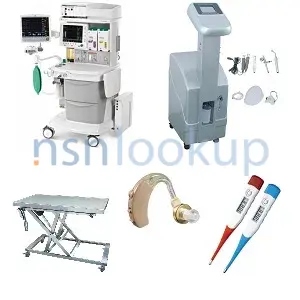Cardiac Pacemaker Lead
Item Name Code (INC) 48355
 |
A bipolar and/or unipolar item, consisting of an electrode and connector, designed for pacing with an implantable PACEMAKER, CARDIAC. It is of the atrial and/or ventricular type. Excludes LEAD SET, PACEMAKER, CARDIAC.
 Additional Information for Cardiac Pacemaker Lead
Additional Information for Cardiac Pacemaker Lead
Cardiac pacemaker leads are medical devices used in cardiac pacemaker systems. They are part of the supply class "Medical And Surgical Instruments, Equipment, And Supplies" in the supply group "Medical, Dental, And Veterinary Equipment And Supplies."
Cardiac pacemaker leads are thin, insulated wires that are implanted into the heart to deliver electrical impulses from the pacemaker to regulate the heart's rhythm. These leads are typically made of biocompatible materials such as silicone or polyurethane, which are safe for long-term implantation in the body.
The leads are connected to the pacemaker device, which is usually implanted under the skin near the collarbone. The pacemaker monitors the heart's electrical activity and delivers electrical signals through the leads to regulate the heart rate and rhythm.
There are different types of cardiac pacemaker leads available, including:
1. Unipolar leads: These leads have a single electrode at the tip, which delivers electrical impulses to the heart. The return path for the electrical current is through the pacemaker case.
2. Bipolar leads: These leads have two electrodes, one at the tip and another near the lead's body. The electrical impulses are delivered between these two electrodes, providing more precise control over the pacing.
3. Active fixation leads: These leads have small screws or tines at the tip, which can be screwed into the heart tissue for secure fixation.
4. Passive fixation leads: These leads rely on the natural tissue growth around the lead to hold it in place.
Cardiac pacemaker leads are available in different lengths and configurations to suit individual patient needs. They are designed to be flexible and durable to withstand the constant movement of the heart.
It is important to note that the implantation and management of cardiac pacemaker leads require specialized medical expertise. Only qualified healthcare professionals should handle and implant these devices.
Overall, cardiac pacemaker leads play a crucial role in the treatment of various heart conditions by helping to regulate the heart's electrical activity and maintain a normal heart rhythm.
 Related Item Names for INC 48355 Cardiac Pacemaker Lead
Related Item Names for INC 48355 Cardiac Pacemaker Lead
 NATO Stock Numbers with Item Name 48355 Cardiac Pacemaker Lead Page 1 of 1
NATO Stock Numbers with Item Name 48355 Cardiac Pacemaker Lead Page 1 of 1
- 016160802
- LPA1200M-52
- RNCC: 3 | RNVC: 9
- LPA1200M-52
- RNCC: 5 | RNVC: 2
- 016160820
- LPA1200M-58
- RNCC: 3 | RNVC: 9
- LPA1200M-58
- RNCC: 5 | RNVC: 2
- 016160804
- LPA1200M-46
- RNCC: 3 | RNVC: 9
- LPA1200M-46
- RNCC: 5 | RNVC: 2
- 013548487
- 4951
- RNCC: 3 | RNVC: 2
- 013545947
- 4269-52
- RNCC: 3 | RNVC: 2
- 013545942
- 486-01
- RNCC: 3 | RNVC: 2
- POLYFLEX
- RNCC: 5 | RNVC: 1
- 013545948
- 4260
- RNCC: 3 | RNVC: 2
- 013545940
- 4270
- RNCC: 3 | RNVC: 2
- 013545943
- 4012
- RNCC: 3 | RNVC: 2
- 013545946
- 4169-52
- RNCC: 3 | RNVC: 2
- 013545944
- 4266
- RNCC: 3 | RNVC: 2
- 016160818
- 1888TC-46
- RNCC: 3 | RNVC: 9
- 1888TC-46
- RNCC: 5 | RNVC: 2
- 013545941
- 479-01
- RNCC: 3 | RNVC: 2
- CARDIFIX
- RNCC: 5 | RNVC: 1
- 013548486
- 476-03
- RNCC: 3 | RNVC: 2
- POLYFLEX
- RNCC: 5 | RNVC: 1
- 013545945
- 4150
- RNCC: 3 | RNVC: 2
- 145707350
- 4892917
- RNCC: 3 | RNVC: 2